How many calories are in Chinese cabbage and how it is useful
Chinese cabbage is a low-calorie vegetable with many health benefits. In the article, you will learn the composition of the product, the area of using its medicinal properties, the appropriateness of its use for weight loss, contraindications for use, as well as recommendations for the selection and storage of vegetables.
The content of the article
Calorie content of Chinese cabbage
Chinese cabbage is a dietary product with low energy value and rich in vitamins and minerals.
Glycemic index
The glycemic index of Chinese cabbage is 15 units.
Moreover, the index does not depend on the processing method, except for frying. In this case, the glycemic index is 35 units.
BZHU
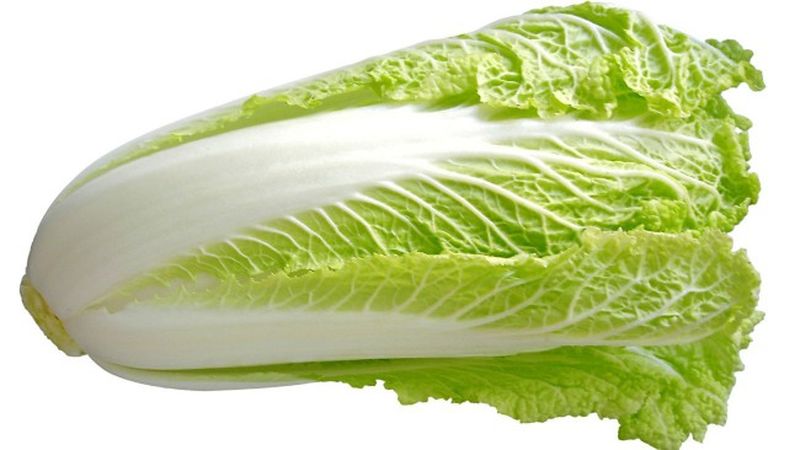
100 g of Chinese cabbage contains:
- 1.2 g protein;
- 0.2 g fat;
- 3.2 g of carbohydrates.
Composition and properties, what vitamins are contained
Chinese cabbage has a variety of health benefits. The scope of its application is very wide.
Vegetable consumption:
- strengthens the immune system;
- stimulates metabolism - accelerates lipid, protein and carbohydrate metabolism in the body;
- normalizes blood pressure;
- reduces weight;
- improves sleep;
- reduces the concentration of sugar in the blood;
- normalizes the activity of the cardiovascular system: strengthens the heart muscle, increases the strength and elasticity of the walls of blood vessels, resolves cholesterol plaques, normalizes the heartbeat;
- stimulates the processes of hematopoiesis and blood purification;
- normalizes the functioning of the nervous system: reduces the negative effects of stress, helps to avoid nervous breakdowns;
- improves digestion processes, increases the production of digestive enzymes;
- removes excess fluid and toxic substances from the body;
- protects against free radicals.
Important! Included in the composition, lysine promotes the absorption and accumulation of calcium, ensures its delivery to the bone tissue.
Also, the vegetable is used in folk medicine to treat mastopathy, sore eyes, acne, headache and migraine attacks, with arthritis and other joint diseases.
Used in home cosmetology: face masks, hair masks.
Chinese cabbage has anti-inflammatory, anti-aging, diuretic properties.
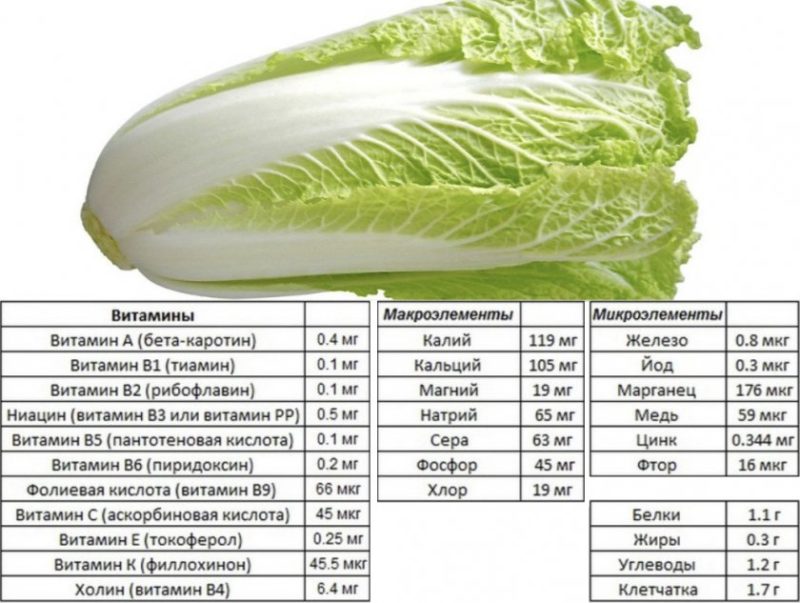
100 grams of a vegetable contains the following vitamins:
- A - 15.6 mcg;
- B1 - 0.04 mg;
- B2 - 0.05 mg;
- B4 - 7.7 mg;
- B5 - 0.1 mg;
- B6 - 0.2 mg;
- B9 - 78 mcg;
- C - 27 mg;
- E - 0.1 mg;
- K - 43 μg;
- PP - 0.4 mg.
In addition, alpha-carotene - 1 mcg, beta-carotene - 0.2 mg, zeaxanthin and lutein - 48 mcg.
100 g of cabbage contains the following trace elements:
- iron - 0.3 mg;
- copper - 37 mcg;
- manganese - 0.2 mg;
- zinc - 0.2 mg;
- selenium - 0.6 mcg.
Macronutrients in 100 g of product:
- potassium - 238 mg;
- calcium - 77 mg;
- phosphorus - 29 mg;
- magnesium - 13 mg;
- sodium - 9 mg.
How many calories in 100 g
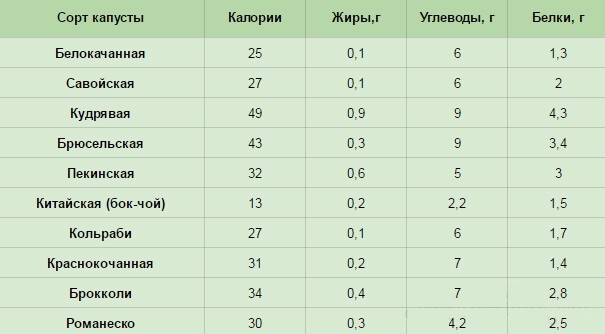
Chinese cabbage is a low-calorie product, regardless of how it is consumed.
Fresh
100 g of raw Chinese cabbage contains 15.8 kcal.
In cooked
When processed, the calorie content of the vegetable slightly increases, in 100 grams stewed cabbage 18 kcal, pickled cabbage leaves contain 19 kcal.
Is it possible to eat Chinese cabbage for losing weight on a diet
Those who want to lose weight can use the vegetable in different ways:
- for dinner, for example, salad with cabbage leaves;
- apply a diet for up to 2 weeks: boiled meat with fresh vegetable leaves;
- fasting days (once every 2 weeks) with the use of Chinese cabbage and other vegetables.
To maintain weight, it is required to include the product in the permanent menu.
Read also:
Is it possible during pregnancy and HB
Chinese cabbage is recommended to be added to the diet of pregnant women.
Important! Contraindication - bloating.
During this period, women have an increased need for vitamins and minerals, Chinese cabbage is their natural source. Eating a vegetable helps regulate weight, relieves puffiness, normalizes blood pressure, improves the functioning of the gastrointestinal tract, relieves symptoms of fatigue, relieves constipation, eliminates the threat of anemia, increases blood clotting, and helps to cope with toxicosis.
Attention! It is recommended to consume the vegetable two weeks before delivery to avoid high blood loss during childbirth.
The weekly rate of a pregnant woman in the early stages is about 300 grams 3-4 times a week and 2 times a week in the later stages.
Nursing mothers are advised to temporarily refuse to use the product, as this provokes excessive gas formation and digestive problems in the child. When the baby reaches three months, the mother can add Chinese cabbage to the diet. It is allowed to consume 50 g of the product per day.
Eating cabbage in boiled or stewed reduces the risk of bloating.
Benefit and harm
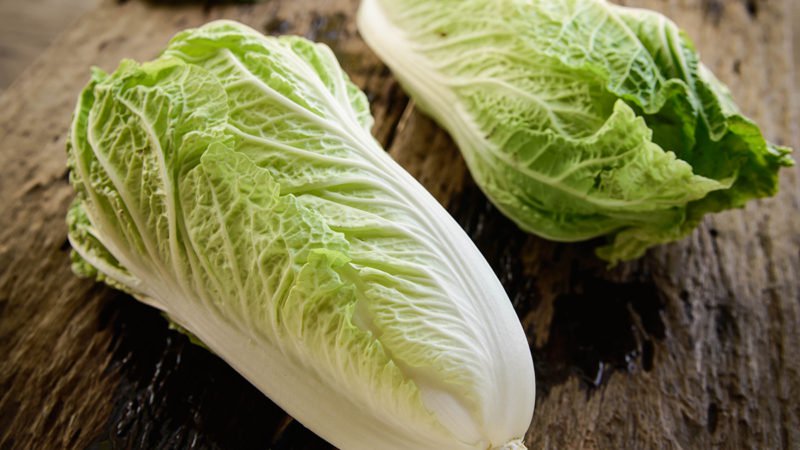
The use of Chinese cabbage for weight loss is very effective, since the product has:
- low calorie content and the presence of a variety of nutrients, which gives the body a false feeling of satiety, while not experiencing hunger for a long time;
- "Negative" calorie content, that is, more calories are spent on the digestion of a vegetable than it contains - the body receives vitamins, minerals and loses excess weight;
- high in fiber, which slows down the absorption of carbohydrates and fats.
Excessive consumption of vegetables leads to negative consequences:
- flatulence;
- diarrhea;
- hypothyroidism;
- belching;
- discomfort and bloating;
- hypoglycemia.
Important! Eating cabbage with dairy and fermented milk products leads to intestinal upset.
How to choose and store correctly
When choosing Chinese cabbage, you should pay attention to the following nuances:
- Leaves. Cabbage leaves should be firm and dry. Sluggish and soft leaves indicate staleness of the product.
- The density of the vegetable. It is recommended to choose heads of medium density, elastic to the touch.
- Weight. The head of cabbage should be heavy, it becomes light due to long storage and drying.
- Smell. An unusual smell is a consequence of growing vegetables with growth stimulants and processing with chemicals.
- Colour. Green cabbage is more fibrous, light cabbage is more juicy.
- There should be no rot on the surface of the head of cabbage, mucus, dark spots, or light deposits.
- No moisture under the packaging... Its presence indicates improper storage of the vegetable.
Store cabbage in the refrigerator on the bottom shelf in a bag or cling film. In such conditions, it is stored for 3-5 weeks. You can also cut the cabbage and freeze it, while the vegetable does not lose its beneficial properties.
Council. If the head of cabbage has been cut open, the rest should be used as soon as possible, as the leaves will turn bitter.
Consumption rates per day
A healthy adult can consume Chinese cabbage in any quantity. The recommended daily allowance is up to 150 g.
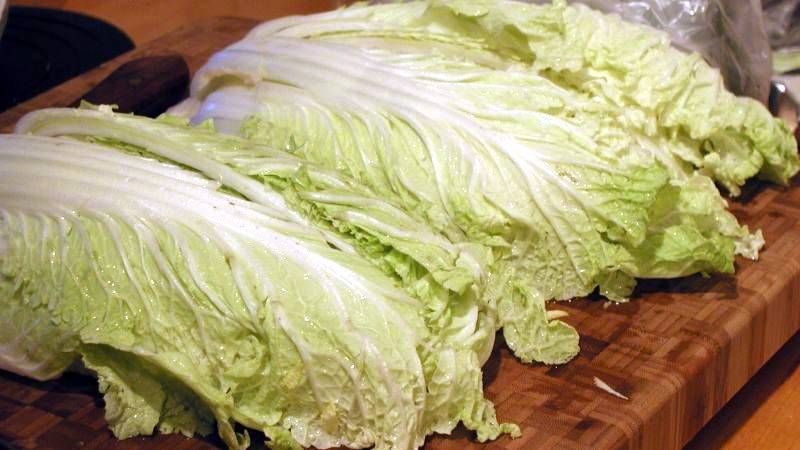
Contraindications
Chinese cabbage is forbidden to use for the following diseases:
- pancreatitis;
- gastritis;
- increased acidity of gastric juice;
- internal bleeding;
- hypotension;
- food poisoning;
- inflammatory processes in the liver and gallbladder;
- diarrhea.
Read also:
Ornamental cabbage: features and description of varieties
Conclusion
Chinese cabbage is an amazing vegetable that combines low calorie content with high nutrient content. The possibilities of its use as a medicine are extensive, including for weight loss. Despite this, it is necessary to remember about contraindications for use and the dangers of excessive use. You should also choose fresh food and store it properly.